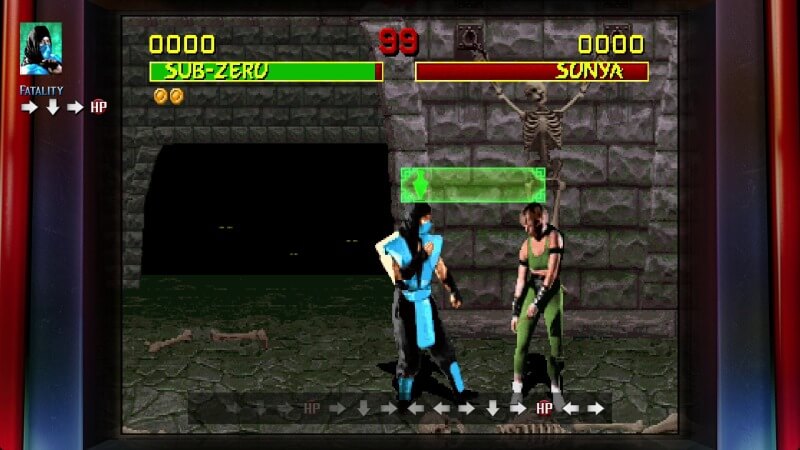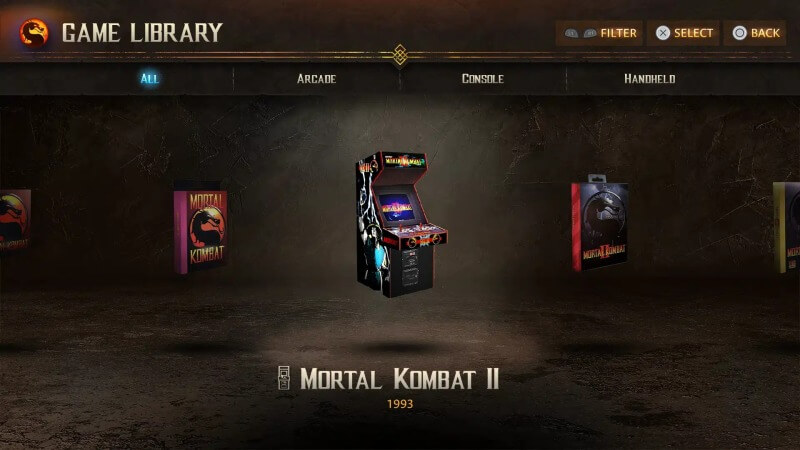Mortal Kombat: Legacy Kollection Is a Blood-Splattered Time Capsule
Hot Fighting History
You never know what’s going to hit. I’m old enough to remember when the first Mortal Kombat game showed up in arcades in 1992. Fighting games had come into their own with Street Fighter 2, which was dominating the coin-op scene at the time, so it wasn’t a surprise to see other games try to tap into that audience. Despite its obviously cooler and edgier presentation, though, Mortal Kombat didn’t seem like a game that would rival Capcom’s smash in popularity. Yeah, the kung fu flick aesthetic was undeniably cool, and the blood and gore really made it stand out, but its digitized graphics also brought up unfortunate memories of Atari’s Pit-Fighter, a beat ‘em up that sat unloved and unplayed in every arcade in the early ‘90s. To me Mortal Kombat seemed like a game that would definitely be remembered, but largely as an also-ran—potentially the runner-up to Street Fighter in the fighting game standings, but not a particularly close one.
It’s a good thing I wasn’t making major business decisions in my early teens. Mortal Kombat blew the hell up, of course, quickly transcending games to become a legit mainstream phenomenon, in some ways one that’s bigger than Street Fighter. (Mortal Kombat has sold more games and considerably more movie tickets than Street Fighter, but it still doesn’t have the cachet or influence within the fighting game scene as its main rival.) It even inspired significant change in how the video game industry regulates itself and handles content, leading to the creation of the Entertainment Software Ratings Board and its ratings system. Mortal Kombat is firmly in the highest tier of video game properties, with its most popular characters and catchphrases meeting even the strictest definition of “iconic.” And I totally didn’t see it coming. (I also thought grebo was the sound of the future. I’m bad at this.)
A series this successful and long-running is perfect material for a documentary, of course, and thankfully Digital Eclipse is around to do it justice. The studio behind The Making of Karateka and Llamasoft: The Jeff Minter Story has innovated a form of interactive documentary that’s ideal for chronicling the history and development of video games. They combine original video footage with archival video and photos to tell the tale, and bundle that alongside playable versions of the games in question. So you can see designers talk about creating their games, pull up original design docs and marketing material, and then immediately play that game—and sometimes even play early demo versions, seeing firsthand the iteration and refinement that goes into making these things. It’s a legitimately brilliant set up and Digital Eclipse hasn’t had a real misfire yet despite doing five of them so far.

Mortal Kombat: Legacy Kollection is their latest. It looks at the first decade (and change) of the series, from the creation of the ‘92 original up through the 2003 Game Boy Advance version of Mortal Kombat: Deadly Alliance, although with some notable omissions near the end of that timeline. Also included are two ill-conceived spinoffs that attempted to expand Mortal Kombat’s story and characters beyond the confines of a fighting game; the action games Mortal Kombat Mythologies: Sub-Zero and Mortal Kombat: Special Forces aren’t mandatory for even the biggest Kombat fan, but it’s still cool to have them on hand, if only as proof of why Mortal Kombat should stick to fighting from here on out. In full there are 22 versions of 11 different games here, from arcade originals to console and handheld ports. If you ever wanted to compare the differences between the arcade, Genesis, and SNES versions of Mortal Kombat, but without having to jump between several different pieces of hardware, now’s your chance.
The game selection has more than it needs to, but there are still some weird omissions. It includes the arcade and both 16-bit home versions of Mortal Kombat and Mortal Kombat II, but only the arcade and SNES editions of Ultimate Mortal Kombat 3. Why leave out the Genesis port? Mortal Kombat Trilogy, an update of 3 that adds in characters and stages from the first two games, is only present as the PlayStation release. There are also no Nintendo 64, Saturn, or Dreamcast ports here, despite Kombat games existing for all three consoles. Mortal Kombat 4—the first to use computer graphics for its characters instead of the digitized figures that had been its signature trademark—is represented only by its arcade version; if you enjoy comparing the home ports of the earlier games to the arcade originals, you can’t do that here with 4. And even though we know why the main version of 2002’s Mortal Kombat: Deadly Alliance isn’t here—Digital Eclipse has yet to emulate a game released for the Xbox, PlayStation 2, or GameCube in any of its collections—it’s beyond weird to throw two different Game Boy Advance ports of it on here instead.
Playing the original Mortal Kombat reminds me why I wasn’t too big on it back in 1992. That first game isn’t great. It gets by on style, attitude, and graphic violence, but is otherwise a clunky, awkward, unbalanced fighting game that isn’t nearly as enjoyable as Street Fighter 2. Fortunately Midway figured it out almost immediately; Mortal Kombat II is fantastic, fixing most of the major issues found in the original, and flashing the kind of depth and variety in characters and fighting styles that the series is now known for. It’s also gross as hell, which is a compliment. And 3 sees even more improvement, although not the massive jump in quality between the first two. Those three make up the meat of this collection; Mortal Kombat 4 is fine but inessential, interesting today more for how it moves away from the digitized characters and starts to resemble the Mortal Kombat games made in the 21st century. The spin-offs are mildly interesting curios that aren’t any fun to play, and the handheld versions are for sicko completionists only—or parents who want to punish their kids by showing them the mutant bastardizations that made up handheld gaming before the Switch and Steam Deck.
 Keep scrolling for more great stories.
Keep scrolling for more great stories.

